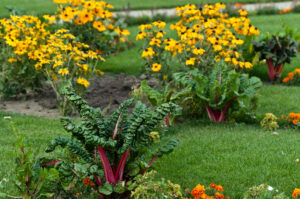
The Power of Sustainable Gardening: Enhancing Eco-Friendly Practices
by Erin Lorde
Sustainable gardening has emerged as a popular approach for cultivating plants while minimising environmental impact and promoting the regeneration of ecosystems. In recent years, this practice has gained traction due to its numerous benefits.
By putting thought into how we garden, we can enhance the ecological advantages while creating aesthetically pleasing outdoor spaces. In this article, we’ll explore the concept of sustainable gardening, and how it can become a modern-day solution to the problem.
What is Sustainable Gardening?
Sustainable gardening combines organic horticulture with environmentally conscious practices. This involves cultivating fruits, vegetables, and flowers without the use of harmful pesticides and chemical fertilisers while minimising our impact on the surrounding areas and encouraging its regeneration. By being more conscious, we can create gardens that are not only beautiful but also contribute positively to the planet.
Reducing Pressure on the Environment
This measure can be characterised by a set of principles aimed at reducing our ecological footprint and safeguarding the environment. These key practices include efficient waste management, such as composting organic materials, conserving water through rainwater harvesting and mulching, reducing the use of fossil fuels by opting for electric tools, and prioritising thoughtful garden maintenance and design.
By adhering to these principles, gardeners actively contribute to helping maintain some sort of contribution to combatting climate change.
Management of Garden Waste
Applying efficient waste management techniques, such as using a hot bin mini composter to produce compost, can transform garden waste into valuable organic matter. Electric chipper-shredders can help create mulch from branches, while greener weed control methods minimise the use of harmful chemicals.
Water Conservation
Conserving water can be easily done with the right tools and strategies in place, regardless of what size your garden is. By collecting rainwater in barrels, employing drip irrigation systems, and using low-angle sprinklers, water waste can be managed. Applying a thick layer of mulch helps retain moisture, improves soil structure, and eases drainage.
Minimising Fossil Fuel Consumption
Lessening our reliance on fossil fuels is the key to eco-gardening. Opting for electric tools instead of those powered by gasoline or diesel can drastically lower our carbon footprint. Planning tool usage efficiently and maintaining them properly can contribute to healthier gardens.
Garden Maintenance and Design
Garden planning and design choices don’t have to dwindle just because you’re looking for eco-friendlier options. By considering natural repellents and companion planting, we can control the use of pesticides and promote a balanced ecosystem. With 46% of gardeners using organic fertilisers instead of those filled with chemicals, there’s a steady growth in awareness in the gardening community.
Cultivating quality produce without relying on chemical inputs will help to ensure that future generations can experience the true taste and aroma of fresh, natural food.
The Importance of Biodiversity
By selecting native plants for our gardens, we support genetic diversity and local ecosystems while avoiding invasive species. Native plants are adapted to the local climate, pests, and soil conditions, promoting resilience, and maintaining a balanced ecosystem.
Consciously preserving biodiversity and avoiding invasive species, gardens become thriving spaces that harmonise with nature and contribute to a healthier environment.
Carbon Sequestration
Viable gardening encompasses not only carbon sequestration but also the preservation of biodiversity. It plays an important role in combating climate change by capturing atmospheric carbon through composting. Transforming plant-based waste into stable humus, gardeners effectively sequester carbon in the soil, preventing its release into the atmosphere as greenhouse gases.
This process not only helps mitigate climate change but also improves soil health, water retention, and nutrient content.
Incorporating Sustainable Elements into Outdoor Spaces
To maintain environmental practices, even in small sitting areas or compact outdoor spaces, integrate eco-friendly materials. By carefully selecting elements like decking materials sourced from sustainable options (reclaimed wood or recycled plastics) we can create functional and visually appealing pathways, seating areas, or raised beds.
This thoughtful integration enhances the aesthetics and functionality of these spaces, providing inviting areas for relaxation, enjoyment, and connection with nature.
Conclusion
Sustainable gardening is a powerful way to cultivate plants while controlling our impact on the environment and promoting the regeneration of our ecosystems. By prioritising sustainable choices in even the smallest outdoor settings, we can contribute to a greener future without compromising on style or comfort.
Let us embrace sustainable gardening to create a greener future, where beauty and sustainability coexist peacefully.